One of the most eclectic rock groups from the 60’s, Traffic, emerged in England in 1967. They embraced rock, psychedelia, folk, R&B, soul and some elements of jazz. Their unique sound was also the result of their unusual instrumentation, from the Indian sitar to the Hammond organ; woodwinds such as saxophone and flute were a landmark of the band; the electric guitar was almost always there, but it wasn’t a prominent instrument in the sound of the band; there was not a regular bass player and often Steve Winwood played bass lines on the Hammond pedals. The original line-up was a quartet, including Steve Winwood, Dave Mason, Chris Wood and Jim Capaldi. At that time, the only well known musician was Winwood, who had been the charismatic lead singer, guitarist, pianist and organist with the Spencer Davis Group since he was 15 years old. Winwood, who was hailed as a child prodigy, had risen to prominence. His elder brother, Muff Winwood, was the bass player in this band. The Spencer Davis Group played mostly R&B, and they got several hits, featuring “Keep on Running”, “Somebody Help Me”, “Gimme some lovin'” and “I’m a man”; the last two have been recorded by many other artists. However, after a three year tenure and at the height of their success, Winwood decided to quit Spencer Davis looking for new musical paths. Members of Traffic had participated in some of the late recordings of the Spencer Davis Group, such as “Gimme Some Lovin'” and “I’m a man”, singing backing vocals and playing percussion. Guitarist Dave Mason and percussionist Jim Capaldi had both been in the bands The Hellions and Deep Feeling, while woodwinds player Chris Wood came out of Locomotive. Winwood, Capaldi, Mason, and Wood met when they jammed together at The Elbow Room, a club in Aston, Birmingham. Capaldi came up with the name of the group while the four of them were waiting to cross the street in Dorchester. Soon thereafter, they rented a cottage near the rural village of Aston Tirrold, Berkshire, to write and rehearse new music. It has been said that after coming back to the cottage from a gig, they set up the equipment and kept playing for hours, until dawn. The use of this cottage would prove to be important in the development of the band.
The story behind the symbol that graces the covers of Traffic albums and many pictures of the group will always be the subject of debate amongst their followers. According to some, it was designed by Chris Wood, being based on the Celtic fiery Wheel of Fortune. The four segments were representative of each member of the group. Others state that it was designed by Carol Duskin, a jeweler by trade, an old friend of the band who adapted the Celtic logo, with some input from Chris and Jim.
Traffic signed to Island Records label (where Winwood’s elder brother Muff later became a record producer and executive), and their debut single “Paper Sun” became a UK hit in mid-1967. Their first album, “Mr. Fantasy”, was also released in 1967. Steve Winwood was on vocals, organ, guitar, bass guitar, piano, harpsichord, percussion, and arrangements. Dave Mason was on vocals, guitar, mellotron, sitar, tambura, shakkai, bass guitar. Jim Capaldi vocals, drums, percussion and Chris Wood was on flute, saxophone, organ, percussion, vocals and sleeve design. All the songs were written by the members of the band in different combinations. There are currently four different versions of the album, depending on mono and/or stereo mixes of the songs and outtakes. Their second single, Mason’s “Hole in My Shoe”, was an even bigger hiy. The band’s third single, “Here We Go Round the Mulberry Bush”, was made for the soundtrack of the 1967 British film of the same name. The three singles and the album were produced by Jimmy Miller.
No sooner had the band started, some rivalry between Winwood and Mason for the leadership and the musical orientation of the band began. Winwood was more blues and and jazz oriented, whereas Mason was more prompted to rock and psychedoelia, including the use of the Indian instrument sitar. Mason left the group alleging musical differences by the time “Mr. Fantasy” was released, but rejoined for a few months of 1968, long enough to contribute to some of the songs on their second album, “Traffic”. Released in 1968, it included the original version of Mason’s “Feelin’ Alright”, which was later recorded with great success by Joe Cocker and many others. Psychedelic influences were still evident, but gone was Beatles and “Lucy in the sky”-a-like tinge of “Mr. Fantasy”. “Whispering tree” has some of the most intriguing lyrics by the band. “Forty Thousand Headmen” was covered by Blood, Sweat and Tears.
I was fortunate enough to attend a live Traffic performance in Eastbourne, Sussex, England in a small club in August 1968. Dave Mason, who had left the band, rejoined the group in that gig.
In 1968, Winwood, Wood and an uncredited Mason recorded on Jimi Hendrix’s Electric Ladyland album. Winwood’s organ playing on Voodoo Chile was widely acclaimed.
“Last Exit,” their third album, is actually a record-company creation, released in 1969. Island Records cobbled the first half of the album with songs which didn’t fit on the previous, whereas the second half is made of live recordings of the group as a trio, which never reached the studio recording.
In 1969 Winwood left temporarly the band to join Eric Clapton, Ginger Baker and Rick Gresch to form the supergroup Blind Faith, which didn’t last too long. In Traffic, Winwood was shortly replaced by keyboard player Mick Weaver, who released great solo albums under the name of Wynder K. Frog: “Out of the frying pan” and “Sunshine super frog”, both very hard to find nowadays. This Traffic line-up, named Mason, Capaldi, Wood and Frog (later shortened to Wooden Frog) made a few recordings for the BBC, which remained unreleased until recently.
After their only and eponymous album and an U.S.A. tour, Blind Faith broke up. Unsure of his path, Winwood agreed to serve as a member of Ginger Baker’s Airforce, taking part in the 1970 live recording of the drummer at London’s Royal Albert Hall. He was thinking of releasing a solo album and assembling new material but, eventually, Winwood rejoined their old mates and reformed Traffic as a trio with Wood and Capaldi, and in 1970 they released their most acclaimed album, “John Barleycorn must die”, inspired by a historic British character and a traditional folk song. John Barleycorn in the song is a personification of the important cereal crop barley and of the alcoholic beverages made from it, beer and whisky. The music on this album was more folk and blues oriented than in their previous ones. The album was extremely well received in the U.S.A. Songs such as “Glad” and “Empty pages”, besides the one which gives title to the album, became some of the highlights by the band. Other songs from the album were intended to be part of a solo recording by Winwood.
In 1971, Traffic quitted Island Records and the album “Welcome to the Canteen”, fifth of the band was released, not under Traffic name but credited instead to the seven individual musicians who took part on it: Winwood, Capaldi, Mason, Wood, Rick Grech, bass player from Family and Blind Faith; Rebop Kwaku Baah, a Ghanaian percussionist, and drummer extraordinaire Jim Gordon, from Delaney & Bonnie and Derek & The Dominoes. It was released to complete a contractual obligation and was recorded live at Fairfield Halls, Croydon, and at the Oz Benefit Concert, London, in July 1971, and it came out for sale in September of the same year. It was recorded during Dave Mason’s third stint with the band, which lasted only a few performances. The tracklist includes one song each from the first three Traffic albums; two songs from Mason’s first solo album, Alone Together; and “Gimme Some Lovin'” from Steve Winwood’s former band, the Spencer Davis Group.
Between the end of 1970 and 1971, Winwood’s health wasn’t in good shape in he was forced to retire for some months. Later, he admitted having been suffering from peritonitis. In 1971 the band released “The Low spark of High Heeled Boys”, which was very succesful in the USA, but didn’t reach the charts in the U.K. The album had a die cut cover design and by 1972 it had sold over half a million copies in the U.S.A. and by 1976 over a million.
However, personal problems arose within the band and, by the end of 1971, Rick Grech and Jim Gordon quitted. In the meanwhile, Jim Capaldi recorded his first solo album, “Oh How We Danced”, which would be the beginning of a long and successful solo career. The album included a surplus recording from The Low Spark of High-Heeled Boys, “Open Your Heart”, featuring drummer Roger Hawkins and bassist David Hood, from the Muscle Shoals Sound Studio house band, who eventually joined Traffic replacing Grech and Gordon. The new lineup (Winwood, Capaldi, Wood, Kwaku Baah, Hawkins, Hood) toured America in early 1972 to promote the album, and their concert at the Santa Monica Civic Auditorium on 21 February was recorded in audio and video and later released on VHS and years later on DVD, under the title of “Traffic live at Santa Monica”, being thought as the only long filmed concert by the band.
In 1973 Traffic released their sixth studio album “Shoot Out at the Fantasy Factory”, which got better sales than reviews. It includes five tracks only, two of them ballads, “Evening Blue” and “(Sometimes I Feel So) Uninspired” and a jazzy instrumental “Tragic Magic”, penned by Chris Wood.
To promote the new album the band engaged in a world tour in the same year, which produced a double live album, “On The Road”, recorded during the European leg of the tour. The band was augmented with Barry Beckett on piano and organ. However, at the end of the world tour, Hawkins, Hood, and Kwaku Baah quitted the band.
In 1974, the band released a new album, “When The Eagle Flies”, with Rosko Gee replacing David Hood on bass. The album sold better in the U.S.A than in the U.K. and to promote it, they embarked in a U.S.A tour which proved to be the last one by the band. Winwood had recurrent problems with peritonitis and Chris Wood with substance abuse. In their last show in Chicago, Winwood walked off the stage in the middle of the show and disappeared. The rest of the band decided to put an end to the tour.
After that, Winwood started an uneven solo career; Jim Capaldi kept with his own one, and Kwaku Baah and Rosko Gee joint the German experimental rock band Can. Kwaku Baah passed away in 1983 during a Swedish tour and, later in the same year, Chris Wood died from liver disease.
In 1994, Winwood and Capaldi, along with Davy Spillane on uilliann flutes and Mick Dolan on rhythm guitar and Akai S1000 sampler programming, recorded “Far From Home”, the last album by the band. Initially, this project was thought as a Winwood solo album. He used digital samplers of Chris Wood’s sax and flute sounds, played through a keyboard.
In the same year a reformed Traffic, with Winwood, Capaldi, Rosko Gee along with Randall Bramblett on flute and saxophone, Michael McEvoy on keyboards, guitar and viola and Walfredo Reyes, Jr. on drums and percussion, toured the U.S.A. with Grateful Dead and performed at Woodstock ’94.
In 2004, the four original members of Traffic were inducted in the Rock & Roll Hall of fame. In the ceremony, Dave Mason joined his old pals Winwood and Capaldi, along with Keith Richards, Tom Petty, Jackson Browne and other personalities performing “Feelin’ Alright” in the Joe Cocker’s version.
Jim Capaldi’s death at age 60 in January 2005, put an end for another Traffic project. In January 2007, a celebration for Capaldi, entitled “Dear Mr. fantasy”, took place at The Roundhouse in Camden Town, London. Guests included Steve Winwood, Paul Weller, Pete Townshend, and many more. It has been released on DVD.




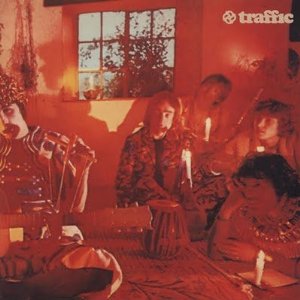
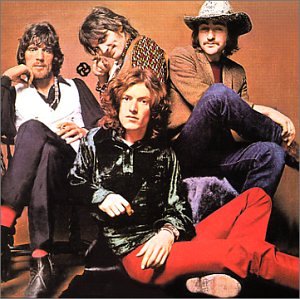

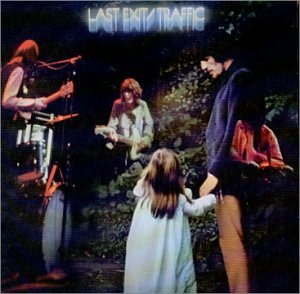
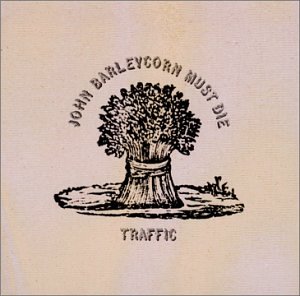
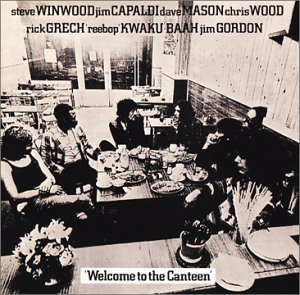
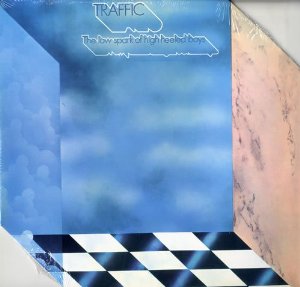




Leave a comment